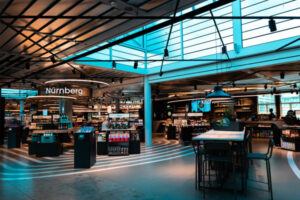ACROSS: What has Immofinanz learned as a result of the current crisis?
GERALD GRÜLL: There are two factors that are of particular importance in a crisis: sufficient liquidity and proximity to customers. As we have both, we were able to take quick and flexible action and respond to the changed conditions. Active communication with all of the parties involved was one of our key success factors. We also benefited from having important data, such as sales figures and store entries, immediately available.
ACROSS: What lasting impact will Covid-19 have on the business models of retail real estate operators?
GRÜLL: To a great extent, this will depend on the further course of the pandemic or its containment. However, we do not foresee renewed lockdown measures in any of the countries in which we operate. The changes to be implemented will primarily affect the shopping center sector: Distance regulations and subjective safety will play greater roles. During the first phase, people will concentrate on shopping and less on entertainment activities that bring crowds of people together. However, a focus on affordable products, which are always in demand during economically difficult times, will prove helpful in this respect, too. Retail parks have a significant advantage, because visitors can enter the stores directly from the parking lots, thereby eliminating additional contact points. The footfall at our Stop Shops has also quickly rebounded to pre-crisis levels. Low rental and operating costs for retailers are additional important elements of our retail formats.
ACROSS: Will Covid-19 have an impact on the layout of future projects?
GRÜLL: The solution certainly does not lie in the construction of even larger areas to allow more distance between people. However, more investment will be made in building services such as air quality, air change, and increased hygiene standards. Technical solutions with regard to access to the centers and stores as well as quick tests on site are also conceivable. In addition, the “customer journey” concept will place even greater emphasis on a pleasant customer experience. This includes, for example, simple, clear routing and orientation within shopping centers.
ACROSS: How has the crisis affected the tenant mix and space requirements for shopping malls in general?
GRÜLL: While the coronavirus has affected the majority of the tenants of retail properties, the impact on them has varied greatly – most notably in terms of long-lasting effects. The fashion and footwear sectors, which currently occupy a large share of shopping center space and in which online sales are also on the rise, particularly during this period of the coronavirus, have been hit harder. A similar situation is to be anticipated in the electronics sector. In the long term, the demand for space is expected to shift more towards personalized services. Such services include beauty and wellness offers. Across all sectors, discounters performed above average, which is attributable to the increased price awareness of consumers, given the more difficult economic environment. This can also be seen in our portfolio, which is centered on cost-efficient formats and is, therefore, relatively crisis-resistant.
ACROSS: The proportion of space devoted to gastronomy has been substantially increased. Given the current circumstances, will that trend turn out to be a mistake?
GRÜLL: In recent years, a number of shopping centers have pursued a strategy of increasing the length of time that consumers spend in them. That was primarily achieved via the acquisition of leisure and entertainment tenants, such as cinemas and game parks. While that strategy proved to be good and sound, the coronavirus crisis has led to people avoiding, almost entirely, those particular forms of social gatherings and entertainment. However, this current development can be effectively counteracted by adapting gastronomy concepts in ways that allow for more distance and flexibility.






